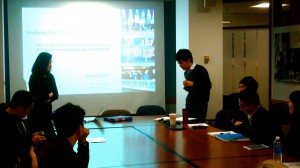
<Striking the ’21st Century’ Trade Deal: The TPP
Perspectives from Japan & South Korea>, Harvard Kennedy School Korea Caucus & Japan Caucus Talk (November 21, 2013)
This past month I had the opportunity to speak to students at the Kennedy School of Government regarding the Trans-Pacific Partnership agreement and the negotiations process. The focus of the talk was centering on what is fundamentally new in the TPP (Trans-Pacific Partnership) negotiations.
Is the TPP a total divergence and shift from the global trade rules and mechanisms that we have established since the liberalization processes of the Uruguay Round? In a way it is, because it sets new standards for sectors concerning services, intellectual property, with additional motivations to abolish tariffs and non-tariff barriers at a very high liberalization rate. We have seen changes come about before: many things have changed since the initial stages of liberalization in the 1990s – while the Doha Development Agenda fell into a conundrum over time (the idea of bringing North-South interests together at the negotiation table was not a good strategy in the first place), preferential trade agreements – FTAs, EPAs, and regional trade blocs were on the rise. As China’s increasing presence in the international arena and the global economic order is seen as a hindrance to the steady maintenance of the U.S. as the rule maker, the U.S. drive for the TPP seems not only as a counter-balancing action but also as a consolidation of its position as the global leader.
The talk at the Kennedy School that day was mainly centered around the interests involving Japan and South Korea, and with the audience mainly coming from the public sectors of the two countries, much of the attention was centered around what South Korea will gain and lose from its potential membership (or from not joining the TPP). As South Korea declared its intent to join the TPP negotiations at the end of November 2013, its potential gains and losses from not joining the TPP is no longer a primary concern for a scholar such as myself, or anyone.
In any case, what’s more interesting here, rather, is painting the bigger picture of the U.S. and China in their global role-play. This morning, I read news that the U.S. Congress could push for passing of the Trade Promotion Authority (TPA) in early 2014 that will significantly boost U.S. policy stance to drive the TPP negotiations. Will China successfully carry out its leadership in framing the RCEP? How will Japan and South Korea’s interests and trade relations with China be changed when the TPP goes into effect in the longer run? Will the conditions of the TPP be as attractive for developing countries in terms of accession? Or will it be stricter than WTO accession? We’ll need to observe at least a couple of decades to see how it turns out.
